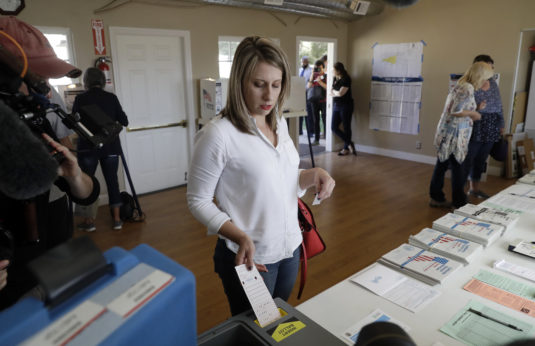
Tom Perez, chair of the Democratic National Committee and former U.S. Secretary of Labor, ticked off to his fellow Democrats across the country the ways their party gained ground in the 2018 midterm elections. Among them: 29 House seats flipped so far, with the chance of a few more once the final results are tallied; seven gubernatorial seats flipped; six legislative chambers flipped (with a total of seven this cycle); four Republican state legislature supermajorities broken; over 290 individual state legislative races flipped (with a total on the cycle up to over 330).
In addition: Four states voted to expand voting rights, including a constitutional amendment in Florida that will restore voting rights to more than one million people with felony records; three state Supreme Court seats flipped; three red states voted to expand Medicaid; two states voted to raise their minimum wages; and one U.S. Senate seat flipped—Jackie Rosen defeated incumbent Republican loyalist Dean Heller in Nevada.
There were some losses, too. The Democrats will now control the House, but in the Senate, Republicans picked up a couple of Democratic seats, slightly widening their bench.
How did one of the nation’s bluest states fare in the congressional elections? Let’s quickly dispatch the U.S. Senate race, between longtime Senator Dianne Feinstein, who recently played such a visible role on the Judiciary Committee in the Brett Kavanaugh hearing, and her challenger, a fellow Democrat, State Senator Kevin De León. De León approached the race from Feinstein’s left flank, arguing that she had not been bold enough in opposing Trump—in fact, that she had voiced her willingness to work with the administration and compromise with it.
Sensing that California voters wanted a more progressive, militant person in that Senate seat, De León offered his voice. His candidacy was a long shot, colored by the suspicion that being termed out of his state office, he had nowhere else to turn but up. Nevertheless, he did have enough supporters in the state Democratic Party that Feinstein, rather embarrassingly, did not even get the official party endorsement. In the end, voters felt that at this critical juncture, experience and long-nurtured relationships in the Senate counted for more than upstart militancy. Feinstein won with a comfortable, though not earth-shattering 54.3 percent, to De León’s 45.7 percent.
Flipping the House
Before the election, California voters believed that anywhere from five to seven of the dozen-plus Republican House seats from the state were subject to flipping, so enraged and mobilized were the state’s voters against the Trump agenda, which those Republican representatives defended and voted for every chance they had.
In response to that blue fury at the Republicans, two of them in fast-changing Orange County decided not to run again and face the voters: Ed Royce and Darrell Issa. Here’s how these contested races played out:
In central California, Congressional District 22’s incumbent Devin Nunes, chair of the Intelligence Committee who tried everything he could to stymie the Mueller investigation into illegal activity by Trump’s cohorts, faced a first-time candidate in Fresno County prosecutor Andrew Janz. Nunes’s politics had so coarsened and become so flagrantly partisan that the local Fresno Bee reversed its habitual support for him and endorsed Janz. Because of the strong conservative nature of the primarily agricultural district, Nunes handily held onto his seat 55.8 percent to Janz’s 44.2 (figures cited from the semi-official election results of the Secretary of State on the morning of Nov. 7). Perhaps this seat was never realistically in play, but since the Republicans lost the House, Nunes will no longer chair a committee. Rep. Adam Schiff, from the state’s 28th C.D., has Democratic seniority on the Intelligence Committee and will presumably become its chair.
Another seat that was never considered “in play” was Kevin McCarthy’s seat in the 23rd C.D., also in the Central Valley. Democrat Tatiana Matta put up a valiant opposition, but McCarthy, not unexpectedly, still came through with 66.5 percent of the vote. McCarthy was widely regarded as successor to retiring Paul Ryan as Speaker of the House if the GOP had held it; he may become GOP leader in the House.
Josh Harder put up a valorous fight against straight party-line GOP four-term Rep. Jeff Denham in the 10th C.D. That race was considered neck-and-neck, and indeed it was close: Denham survived the challenge winning 50.6 percent, while Harder pulled in 49.4 percent. With just over 1 percent between them, it’s still conceivable that votes remaining to be counted could alter the result. A rematch in 2020 might well yield a different result after two more years of Trumpery.
In the 39th C.D., which Ed Royce is leaving, his former director of community relations and Asian affairs, Young Kim, aimed to become the first Korean-American in Congress. It seems she has achieved her goal, winning 51.3 percent against 48.7 percent for Democrat Gil Cisneros. An immigrant herself, she is believed to be a moderate Republican with some affinity for immigrants, but on other issues she has embraced a consistent right-wing agenda. Once in office, it remains to be seen if she maintains her open-mindedness on immigration. With a more than two-point spread between them, this election is not likely to change in a final count. This race pitted an Asian-American woman against a Latino man, but both of those communities are themselves divided politically. Most voters probably stuck with their party, but there are a lot of independents: Some no doubt voted ethnicity over policy, and others the reverse.
One congressional seat that Californians truly expected to flip was that of reliable Trump hardliner Mimi Walters in the 45th C.D. University of California Irvine law professor Katie Porter went up against her, hoping that the changing demographics in Orange County would work to her favor. But Walters eked out a 51.7 percent win to Porter’s 48.3 percent. It was tempting to trust that the newly evolved electorate in the district would go for a Democrat, but the Republican stronghold held fast. Here is another district where in two years a rematch might well play out differently.

The tenacity of Republican loyalty was most vividly demonstrated in C.D. 50, where Duncan Hunter has served in Congress for ten years, and his father before him (who shares the same name) served for 28 years. A few weeks before Election Day, Hunter was indicted on 60 counts for diverting a quarter of a million dollars in campaign funds to his and his wife’s personal use—including thousands of dollars spent on Hunter’s extramarital escapades. His opponent was Ammar Campa-Najjar, 29, of mixed Mexican-Palestinian background, who served in Obama’s White House. Hunter released television ads scurrilously attacking Campa-Najjar as a Muslim terrorist that earned him spirited objection, even from fellow Republicans, for their outright racism. Despite all of Hunter’s demerits, he nevertheless soared above Campa-Najjar in the vote, 54.3 percent to 45.7 percent. Legally, Hunter would be permitted to serve in Congress even as he serves a sentence in prison, if that is what happens. But possibly the new Democratic-dominated House will find a way to censure or expel him. Campa-Najjar is a highly attractive and articulate candidate from whom much will yet be heard.
And now some victories…
Among the 53 California House seats, most were reliably red or blue, and we have not reviewed all of those races, which produced predictable results. In the three remaining hard-fought races, there appear to be Democratic victories and flips. Three turned out to be disappointingly fewer than California Democrats had hoped to contribute to the national blue wave. The final count is not in yet, however, and the provisional and mail ballots may alter the results. Not all these races, at press time, have been conceded.
Katie Hill, executive director of the largest homeless services organization in the state, went up against Rep. Steve Knight in the 25th C.D. in northern Los Angeles County, the last corner of conservatism in the county. Knight was shockingly tone-deaf to his constituents, who have become more diverse over the years he has been in Congress, calling Social Security “a bad idea” and voting with his GOP team to repeal the Affordable Care Act.
Once a favorite son of the district, Knight had fallen out of step with his voters. Late in the campaign, he aired a TV spot featuring a local veteran named David Brayton, who was well known for his anti-Semitic, anti-Muslim, and racist views, which he regularly posted on social media. Responding to protest, Knight was forced to take the ad down. Hill galvanized the progressive movement with her energetic campaign, recruited an impressive body of weekend volunteers for phone banking and precinct walking, and came out ahead with 51.3 percent versus Knight’s 48.7 percent, flipping that seat.

In the open 49th C.D. seat vacated by Darrell Issa, Democratic Party activist Mike Levin ran against Diane Harkey, who had previously served six years in the California Assembly, where she earned “A” ratings from the NRA and other conservative organizations. Issa had barely squeaked through in his last election, which no doubt influenced him to retire this year. The district has changed, and pollsters predicted it would lean Democratic. They were right: Levin sailed away with 53.5 percent of the vote to Harkey’s 46.5. A second flip.
In a real nail-biter, businessman Harley Rouda won a spot on the 48th C.D. ballot after a much contested primary that put him against longtime U.S. Rep. Dana Rohrabacher, considered Vladimir Putin’s best friend in Congress. In a recent development, Rohrabacher was questioned by Devin Nunes’s Intelligence Committee regarding his numerous Russian connections to the Trump election, but his testimony was not released. Against a background of growing embarrassment over their congressman, voters in his district declined him another term.
Rouda emerged with a narrow 50.7 percent win, with Rohrabacher at 49.3 percent. This flip has yet to be conceded. What will become of Rohrabacher’s testimony to Congress now that Adam Schiff is poised to take the reins of the Intelligence Committee? If Schiff releases it, those who voted Rohrabacher out will be glad they did, and those who voted for him once again just might think more deeply about their party loyalty.
One factor in the contested California races is that in almost all of them the challengers were inexperienced, first-time candidates. Most, if not all of them, had refused corporate money, yet were able to amass a substantial campaign bank owing to the widespread disgust with the supine Republican seat-holders. Some of the post-election conversation has suggested that on both sides of the aisle there may be a newfound willingness to compromise on some issues simply in order to get something done in this Congress to show voters in the next round. Much will depend in 2020 on how successfully the newly configured House performs.










